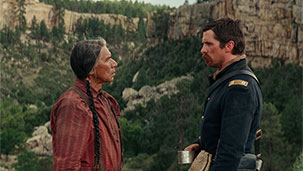You did a fine job.
I think.
And this is an issue at the heart of a lot of historical dramas that assert a kind of authenticity as a central reason to take them seriously—not just as a setting for an entertainment. In the case of Hostiles—a period piece set during the late 1800’s and the end of “The Indian Wars” in the United States— it matters more than most. A film where the central thesis is that certain aspects of human psychology override any other concerns, tribal or otherwise, requires a meticulous attention to detail. Because if you get the small details wrong, why should anyone believe your pronouncements about something so fundamental?
Hostiles tells the story of a US Calvary Captain, a survivor of the bloody conflict inaccurately called “The Indian Wars” (how something is a war when it’s so lopsided and the outcome so obvious is beyond me—slow genocide is probably a more accurate description), who is tasked with escorting a Cheyenne war chief to his ancestral burial grounds. The war chief is dying from cancer and someone in the military bureaucracy has decided this gesture will somehow win the hearts and minds of the few remaining tribes. The Captain, clearly suffering from PTSD, is a reluctant participant, to say the least. Nor do his fellow captives seem particularly thrilled at the prospect of crossing a continent with someone directly responsible for the deaths of so many of their kinsman. Add to the mix a woman who they discover along the way, a very recent sole survivor of a tribal raid that decimated her family, and you have all the elements of a convoluted moral drama.
Wes Studi, the actor playing the war chief in question, learned to speak Cheyenne for the role. Studi is Cherokee and while he certainly seemed convincing in his speech, the fact is he learned to speak Cheyenne phonetically, meaning he didn’t really understand a word he spoke. The language may have been perfectly authentic, but the man speaking it had to take it on your authority that what he thought he was saying was in fact what was coming out of his mouth. And that is just a small example of the leap of faith required to achieve even a vague facsimile of truth.
How, as a viewer, do you make any kind of judgement about those small details unless you’re an expert? It’s one thing to create and reproduce costumes and language, but to try and evaluate the degree to which it accurately represents a particular moment in time requires an intimate familiarity with the period in question. And most audience members don’t possess that kind of familiarity.
It’s a tricky thing, when a film attempts to do something other than tell the story of a group of people in a specific set of circumstances. When its intention (in this case stated in the title of the film) is to assert a larger truth about humanity as a whole—that as your perspective and experience change so too do your allegiances and perception of who is an ally and who is an enemy. It requires a kind of moral authority on the part of the film maker that is, in part at least, underpinned by the degree to which the audience believes the world you have created.
It becomes even more fraught when most people watching the film aren’t equipped to make any kind of informed judgement about whether the details in question are accurately portrayed, or are simply playing to the limited and often cartoonish preconceptions all of us are susceptible to sometimes.
I certainly don’t know enough about America circa 1890 to make any but the most cursory judgement, and I certainly don’t know enough about Cheyenne culture specifically to make any kind of judgment at all.
What I can say, after all that, is that despite its sometimes retrograde seeming narrative (a lot of John Ford here) is I found myself being won over none the less. Part of that is Rosemund Pike, Christian Bale and Wes Studi’s clear commitment to the material. Part of it is I want to believe that there are commonalities—even ones that can end in blood and death—that override our often myopic tribal concerns. Finally, the detail in the film, including your contributions, seemed proper to the time. It felt lived in and real and helped create a sense of authenticity that made me believe what I was seeing.
Problem is, I’m not sure if what I was seeing and hearing was just what I wanted to see and hear, or something more profound.
Sincerely,

Tim







